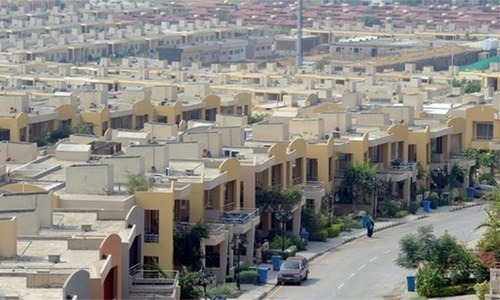ISLAMABAD: The mushroom growth of housing societies has been eating up fertile agricultural lands and affecting the most important sector of Pakistan, WealthPK reports.
The agriculture sector is considered the backbone of the national economy. However, the sector is facing a number of issues that are reducing its production. One of the key causes of the drop in agricultural output is the establishment of housing societies on fertile lands.
Dr Muhammad Hanif, a senior scientific officer at the National Agriculture Research Centre (NARC), told WealthPK that agriculture was a key component of the economy and a powerful growth engine in the majority of developing countries. “Since Pakistan is primarily an agricultural economy, agriculture is one of the main sources of national income and employment. The agriculture industry engages the largest portion of the population, either directly or indirectly,” he added.
He said that although agriculture was considered the backbone of the country’s economy, it was recently plagued by a number of challenges, including a reduction in the fertile land available for cultivation due growth of housing societies.
“In Pakistan, housing societies are growing at an alarming rate, resulting in the loss of valuable agricultural land annually. There are around 8,700 housing societies across the country, with at least 6,000 functioning illegally as they are not registered with the relevant authorities,” said Dr Hanif.
He said that the mushroom growth of housing societies resulted in a decrease in farmland that could be used for agricultural purposes. He added that the use of agricultural land for residential purposes resulted in a shortage of food in the country as well as a rise in costs for basic necessities.
“Enhancing agricultural output necessitates the increase of agricultural area. It can play a crucial role in promoting economic growth because of its strong forward and backward links with the secondary, industrial, and tertiary, services, sectors,” he said.
The agriculture sector contributed 22% to Gross Domestic Product against 19.2% in the last year. At least 37.4% of the labour force in the country is attached to the agriculture sector. More than 65% of the population of the country depends on agriculture for livelihood.
“Pakistan’s agro-food exports contributed 17% to the national exports in 2021. The agro-food exports were $4.3 billion in 2021, showing an increase of one percent as compared to the preceding year. As part of the semi-industrialised economy, Pakistan has a well-integrated agriculture sector,” said Dr Hanif.
He said that the government needed to chalk out a proper and effective plan to control the haphazard growth of housing societies in the country. He added that the transition from horizontal to vertical construction was preferable to conserve agricultural land.
The official said that intervention of the government was required to limit the future expansion of housing societies and conserve agricultural land in the country. He added that there was a severe shortage of wheat, fruits and vegetables in the domestic market due to the shrinking of agricultural land.
“As witnessed in Multan, the unplanned expansion of cities is also damaging orchards as mango trees have been cut down to make way for housing societies,” he said.
According to Waheed Ahmed, the patron-in-chief of the Pakistan Fruit and Vegetable Association (PFVA), mango production in the country was 1.8 million tonnes in the previous year, which declined by 50% in the ongoing year.
“Due to the low production, the mango export target has been reduced by 25,000 metric tonnes. This year only 125,000 tonnes of mangoes were exported. Last year, 150,000 tonnes of mangoes were ex…





